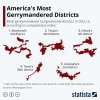I think we're talking past each other here.
You're reducing all differences to economics, when left and right have both political and sociological implications than go beyond that. You can have right-wing interference with the economy just as much as left. Making it all about involvement in the economy doesn't make the definitions any more clear. Now you've just created an infinite variety of leftist forms of government with nothing more in common than they like to interfere with commerce.
No system will check all the boxes in any direction, and it's all complicated by the horseshoe theory--left and right do indeed share characteristics. That doesn't mean that authoritarianism is left wing. Conversely, anarchism may be economically right wing, by your definition, but few anarchists would feel at home at the Heritage Foundation, because they have severe disagreements with the political and social parts of right wing ideology.
The reason I emphasize the economic is because by the American definition of "right" and "left," it generally goes by that. On the far right end of the spectrum, you have your anarcho-capitalism types. They want no central bank, barely any federal government, gold standard, etc...then on the far left end, you have your hardcore socialism types. In-between is a whole slew of mixtures.
But outside of that economic definition, right vs left becomes much more difficult to define:
Socially conservative? Can be left or right (the Soviet Union was very socially conservative for example).
Socially liberal? Can be left or right.
Nationalist? Can be either.
Internationalist? Can be either.
Racist or non-racist? Can be either.
Now in the world of collectivism, there are a variety of different kinds. "Socialism" is used to refer to government ownership and/or control over the means of production. It is not necessarily nationalist or racist (though those can exist in such a society, as the Soviet Union was very nationalist and had racism and anti-Semitism). But ideologically, its main gist is about the working class standing together in unity against their capitalist oppressors.
An alternative form of collectivism was grounded in the nation and race. Economically, this collectivism, most popularly known as fascism, could be left or right-leaning (to a degree), as its main focus is not on the economic but on the nation and the racial purity of the nation. Such nation and race-based collectivists often disdained the conventionally socialist ones as they saw them as sacrificing the nation and messing up the racial aspects of it.
A Marxist-Leninist socialist might want to kill you because of your being seen as a class traitor. You so much as set up a fruit stand and they'd want to shoot you. Race and nation per se weren't big issues to them from this. Whereas a fascist would want to kill you if they saw you as betraying your nation and in particular your race. Nazis argued amongst themselves about (economic) socialism vs capitalism, sometimes disdaining both.
Both being forms of collectivism,, there is nothing in either about the sanctity of the individual or the idea that the State exists to protect the pre-existing rights of the individual. In the one, you subordinate yourself to the collective in the name of economic equality. Everything will belong to everyone. In the other, you subordinate yourself to the national organism, in the name of national greatness and (in the case of the Nazis) racial domination.
Now the Nazi economy is confusing to many. The Nazis engaged in a large amount of privatization of industry and crushed labor unions,, but they also subjected said private economy to a heavy amount of state direction and control. This was partially due to rearmament and then the war, but also the Nazis, while not against private property and enterprise, would not hesitate to take over your company or nationalize it if you strayed too far from the party line. This also underlines my point about how dictatorships always require some degree of direct state intervention in the economy.


